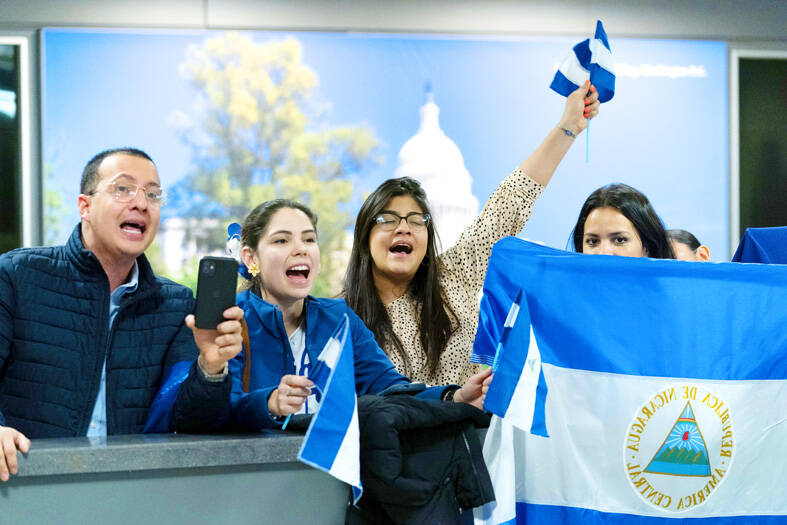A decision to put 222 Nicaraguan dissidents on a plane to Washington came suddenly, and officials in the US and Nicaragua said the move took them by surprise.
The plane was barely off the ground on Thursday when word began to spread of the surprise release of opposition figures, journalists, activists and priests who were considered to be political prisoners.
The majority had been sentenced in the past two years to lengthy prison terms. The mass release came together in a couple of days and the prisoners had no idea what was happening until their buses arrived at Managua’s international airport.

Photo: AP
The prisoners created political and public problems for Nicaraguan President Daniel Ortega, and releasing them relieved pressure on his regime, analysists said.
“The political pressure of the prisoners, the political prisoners, became important to the Ortega regime, even for the people, the Sandinista people who were tired of abuses,” opposition leader Juan Sebastian Chamorro, who was one of those released, told a news conference on Friday.
“I think [Ortega] wanted to basically send the opposition outside of the country into exile,” he said.
Ortega had said they are terrorists funded by foreign governments and worked to destabilize his government after huge street protests occurred in April 2018.
The timeline was “very short,” a US Department of State official said on condition of anonymity, suggesting the transfer was put together in as little as two days.
“Once we were aware of this, we were able to spring into action and ensure the safe transportation of these individuals,” the person said.
Nicaragua drafted a list of 228 prisoners it wanted off its hands. The US struck four of them off the list, and then two more refused to get on the plane on Thursday, officials from both countries said.
Jared Genser, a human rights lawyer who handled the cases of opposition leaders Chamorro and Felix Maradiaga, said on Friday that “dictators never release political prisoners because they want to, they release them when they have to, when releasing them is the least worst choice.”
It could have been that the constant attention to the prisoners’ plight from human rights organizations, the UN and foreign governments made them more of a liability than simply expelling them from Nicaragua, Genser said.
One of the two prisoners who decided to stay in Nicaragua was Catholic Bishop Rolando Alvarez, a decision that resulted in a Nicaraguan court on Friday sentencing him to jail for 26 years.
The written decision declared Alvarez to be “a traitor to the fatherland” and said he would not step out of jail until 2049.
The court also stripped the bishop of his Nicaraguan citizenship and fined him US$1,600.
Alvarez, who is Nicaraguan-born but educated in Spain and the Vatican, declined to board the chartered plane carrying exiled prisoners to the US.
Ortega called Alverez’s decision “absurd” and said he would return to jail for “terrorism.”
Alvarez had been an outspoken critic of what he called restrictions on religious freedom under the Ortega government.
Additional reporting by AFP

Thousands gathered across New Zealand yesterday to celebrate the signing of the country’s founding document and some called for an end to government policies that critics say erode the rights promised to the indigenous Maori population. As the sun rose on the dawn service at Waitangi where the Treaty of Waitangi was first signed between the British Crown and Maori chiefs in 1840, some community leaders called on the government to honor promises made 185 years ago. The call was repeated at peaceful rallies that drew several hundred people later in the day. “This government is attacking tangata whenua [indigenous people] on all

RIGHTS FEARS: A protester said Beijing would use the embassy to catch and send Hong Kongers to China, while a lawmaker said Chinese agents had threatened Britons Hundreds of demonstrators on Saturday protested at a site earmarked for Beijing’s controversial new embassy in London over human rights and security concerns. The new embassy — if approved by the British government — would be the “biggest Chinese embassy in Europe,” one lawmaker said earlier. Protester Iona Boswell, a 40-year-old social worker, said there was “no need for a mega embassy here” and that she believed it would be used to facilitate the “harassment of dissidents.” China has for several years been trying to relocate its embassy, currently in the British capital’s upmarket Marylebone district, to the sprawling historic site in the

‘IMPOSSIBLE’: The authors of the study, which was published in an environment journal, said that the findings appeared grim, but that honesty is necessary for change Holding long-term global warming to 2°C — the fallback target of the Paris climate accord — is now “impossible,” according to a new analysis published by leading scientists. Led by renowned climatologist James Hansen, the paper appears in the journal Environment: Science and Policy for Sustainable Development and concludes that Earth’s climate is more sensitive to rising greenhouse gas emissions than previously thought. Compounding the crisis, Hansen and colleagues argued, is a recent decline in sunlight-blocking aerosol pollution from the shipping industry, which had been mitigating some of the warming. An ambitious climate change scenario outlined by the UN’s climate

A deluge of disinformation about a virus called hMPV is stoking anti-China sentiment across Asia and spurring unfounded concerns of renewed lockdowns, despite experts dismissing comparisons with the COVID-19 pandemic five years ago. Agence France-Presse’s fact-checkers have debunked a slew of social media posts about the usually non-fatal respiratory disease human metapneumovirus after cases rose in China. Many of these posts claimed that people were dying and that a national emergency had been declared. Garnering tens of thousands of views, some posts recycled old footage from China’s draconian lockdowns during the COVID-19 pandemic, which originated in the country in late